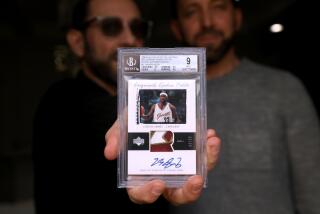Among Israeli Ultra-Orthodox, Rabbi Cards Are Traded Like Baseball Counterparts
- Share via
JERUSALEM — Forbidden by religious law from playing worldly games, children in Israel’s ultra-orthodox neighborhoods have come up with their own fun: trading “rabbi cards” that depict the bearded faces of their favorite sages.
Much as boys in America haggle over the worth of a Babe Ruth baseball card, their counterparts in Jerusalem’s Geula neighborhood barter over the value of a Rav Kanyetzki card.
Their long, curly sidelocks bounce with excitement as they explain to the uninitiated that since the venerable rabbi’s death over a year ago, the value of his card has gone up.
Fad Began Several Years Ago
“For a dead rabbi, you’d have to give me 20 photos of a living rebbe (rabbi),” explained one 10-year-old, too shy to give his name.
The fad began several years ago when photography shop owner Shmuel Shnitzer started selling pocket-size color photos of Jerusalem’s most revered rabbis.
“A child can buy the photograph and then he’s likely to ask his father about the rabbi and that way learns about his teachings,” Shnitzer said.
“Why should kids trade picture cards of imports such as Aulcie Perry (an American basketball star who played for an Israel team) when there are enough good Jews to photograph,” he said.
200 Different Photographs
Like gurus or Shia Muslim ayatollahs, the most revered rabbis in Jewish history have disciples, who run their own religious seminaries and dress alike.
Over the years, Shnitzer has collected about 200 different photographs of many of Judaism’s most important spiritual leaders. He sells them at a shekel (70 cents) apiece. But unlike baseball cards, there are no details on the back.
He does a brisk business with religious teachers who often buy cards to give to pupils as presents for the Sabbath.
Before religious holidays young women from abroad studying in Jerusalem are frequent customers, buying the cards for brothers back home.
Some More Prestigious
“I have about 500 cards,” said one youngster on the street outside Shnitzer’s store. “Some from Jerusalem, some even of rabbis from abroad,” he said.
Photography shops in the ultra-orthodox town of Bnei Beraq near Tel Aviv have also taken up the rabbi card business, and there is trading between children in the two towns.
Although Shnitzer charges the same price for every photo, some are considered more prestigious than others.
A picture of all the rabbis of the ultra-orthodox religious court together, for example, is a prize for young enthusiasts.
Surge in Demand
So is a photograph taken in Jerusalem of the venerable Admor of Bobou on his last visit to the Holy Land from the United States. There was a run on photos of the Admor of Lelov when he died six months ago.
An admor is the head of an ultra-orthodox sect. The word is a Hebrew acronym for “our master, our teacher, our rabbi.”
“When a rabbi is in the news, for one reason or another, there is usually a surge in demand for photos of him,” Shnitzer explained.
On an average week, he sells dozens of photographs from his store on the main street of the Geula neighborhood, which has much of the atmosphere of a 19th-Century East European ghetto.
“If a kid has some pocket money, sometimes he buys an ice cream and sometimes he buys a photo of a rabbi instead,” he said.
More to Read
Sign up for Essential California
The most important California stories and recommendations in your inbox every morning.
You may occasionally receive promotional content from the Los Angeles Times.











